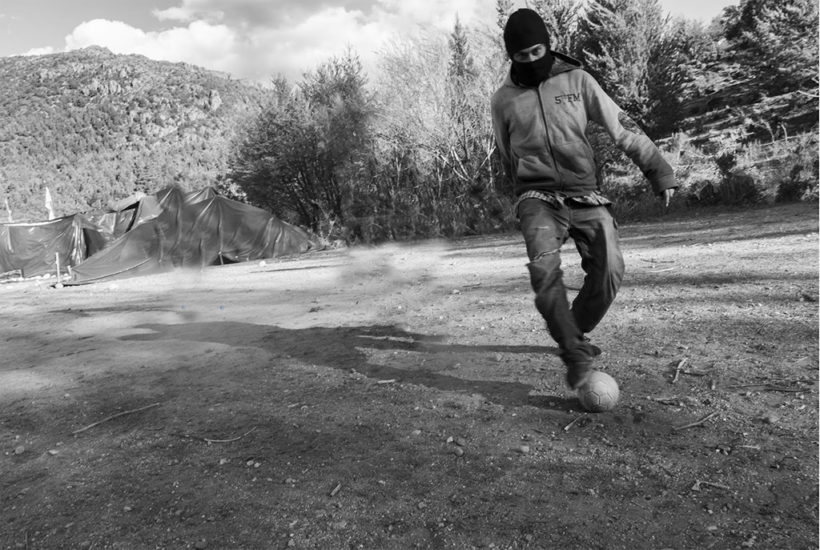Portrait of Elías Garay at the humanitarian encampment (Image by Roxana Sposaro)
What role did the National State, the provincial government and the legal power of Río Negro, the extractive capital, the police institution and the media (local and national) play in the shooting of Elías Garay?
As in the prisons, Elías Garay’s guard was removed from the corridors, to allow plainclothes policemen to enter his cell (besieged camp) and kill him with a bullet in the head and mortally wound a comrade. It is obvious: there was planning.
The masterminds of this double attack waited for the elections to pass, they waited for the humanitarian encampment (to collaborate with the Quemquemtreu lof, which the provincial government had kept isolated for 52 days) to be lifted. They waited until only a police cordon remained – which prevented people, food and shelter from entering the community at all times. They waited until only the isolated community and the police cordon remained on the scene. In this context, two robust men entered (the fact is relevant) and armed with 22-calibre shotguns fired with a single objective: to kill an Indian, to discipline the rest! To scare them away.
From the outset, it was not known how many and which people were in the lof. It was only known that they were part of the lof Quemquemtreu and that they were waiting in a “pine forest”, sheltered near the fire and the hill, waiting to be taken out by force at any moment (even up to this moment, at 6 p.m. on Monday 22 November, it is not known how many people are sheltered in the lof and in what state they are in).
Days before this murder, several local media, such as the newspaper Río Negro (owned by Clarín), led a strong media campaign to link the arrest of three men at the border with the alleged terrorist activity attributed to the lof Quemquentreu. In just one day (7 November 2021), Diario Río Negro published six articles using the phrases “no negotiation with terrorists”, “Mapuche activist”, “Mapuche conflict” and “we will not allow social peace to be disturbed”. This last phrase corresponds to the Attorney General of Neuquén José Gerez, who travelled to Chile with the aim of articulating strategies on the part of both states to combat this ethnic “problem”. “We will be implacable in preventing the entry of anarchic groups,” warned Gerez. Meanwhile, during the same days, the Minister of Security of the Nation, Anibal Fernández, made reference on his twitter account to the amount of ammunition and the type of clothing that these three men were wearing, similar to that worn by hunters (hunting grounds) who move illegally through the area (see “The future is negationist, extractive and repressive”). Curiously, according to the account of Gonzalo Cabrera (the young Mapuche who was with Elías Garay and who received two lead shots in the abdomen), the two men in civilian clothes who showed up at the lof introduced themselves as hunters before starting to shoot. How did these two robust men get in and out of a place that has been under siege for two months by special forces (COER)?
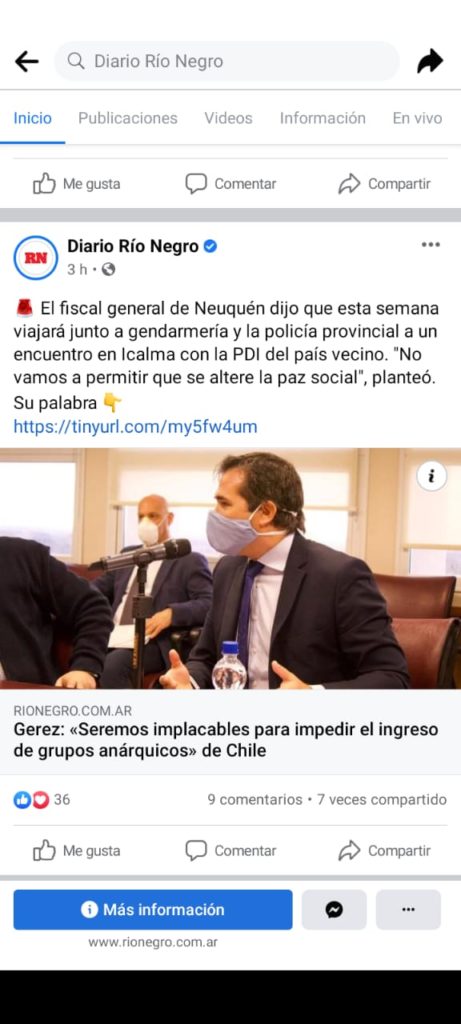
On the other hand, and following this communicational analysis, during the whole day of Sunday 21 November, the hegemonic media in Argentina kept silent and published inaccurate information about the events, with the obvious aim of covering up. Covering up for whom or what? The links that the business CEOs who own these media maintain with Benetton? With Patagonia Argentina? At 9:53 p.m. on the night of Sunday, November 21, Página 12 had not yet published a single note of what had happened (when the shots were fired at three in the afternoon), while Clarín spoke of “incidents” in the lof Quemquemtreu and Infobae and La Nación referred to “confusing facts”. Only at six in the morning of the following day, Monday 22 November, did Página 12 publish a detailed article on what had happened, but practically 15 hours went by before making any reference to the case, while, for example, the coverage of the murder of Lucas González was followed up immediately, minute by minute.
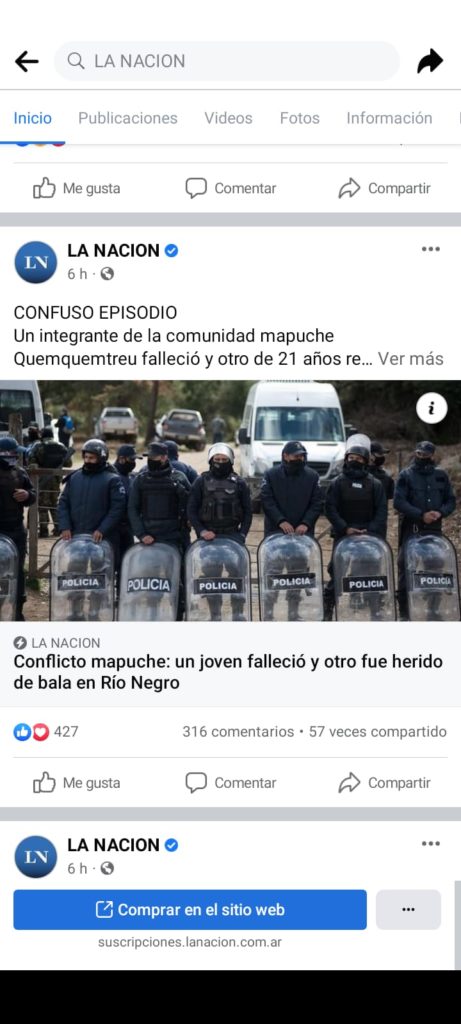
The political and legal decision to delay and not act at the height of the circumstances for two months, the building of social discontent and the preparation of the communication and social scene prior to the murder, the liberation of the area on the same day that Elías Garay was shot, the complicit silence throughout the day on the part of the country’s hegemonic media, and the not insignificant addition that on the evening of the same Sunday a group of “patriotic citizens” promoted actions of repudiation (racist insults, threats with knives, running) against the demonstrators who mobilised to the centre of El Bolsón to demand justice for the young Mapuche who had been murdered.
In this sense, today, before midday, the mayor of El Bolsón, Bruno Pogliano, publicly acknowledged in a press conference that last night, unlike on other days, police custody had disappeared not only from the access to the lof Quemquemtreu, but also throughout the city. And this could be seen when the group of “patriotic citizens” (mentioned above), after leaving a traditional festival, took out the people who were demonstrating against the murder of Elías Garay by their own means. No police were ever seen! In the multiple audios and videos circulating on social networks, only demonstrators can be seen peacefully leaving, while local citizens insult them by reaffirming nationalist and patriotic slogans. Curiously, Bruno Pogliano, thanked the “gauchos” for having freed the streets and, in the same gesture of gratitude, complained because today he needed to make a complaint about the acts of vandalism suffered by a family business, but given that the prosecutor Cecilia Cendón has not yet descended from the hill with the body of Elías Garay, he was unable to make the complaint. “The national state must intervene and watch over the safety of us, the Argentine citizens,” Pogliano summed up, without a twitch on his face. The slogan “you can’t talk to terrorists” once again took on form and relevance, as in the old days of the Rocío era, in the action of the “gauchos” and the voice of the mayor of a city in Río Negro. Denialism, colonial thinking and the justification of repression with ethno-racist characteristics, as valid as 140 years ago.
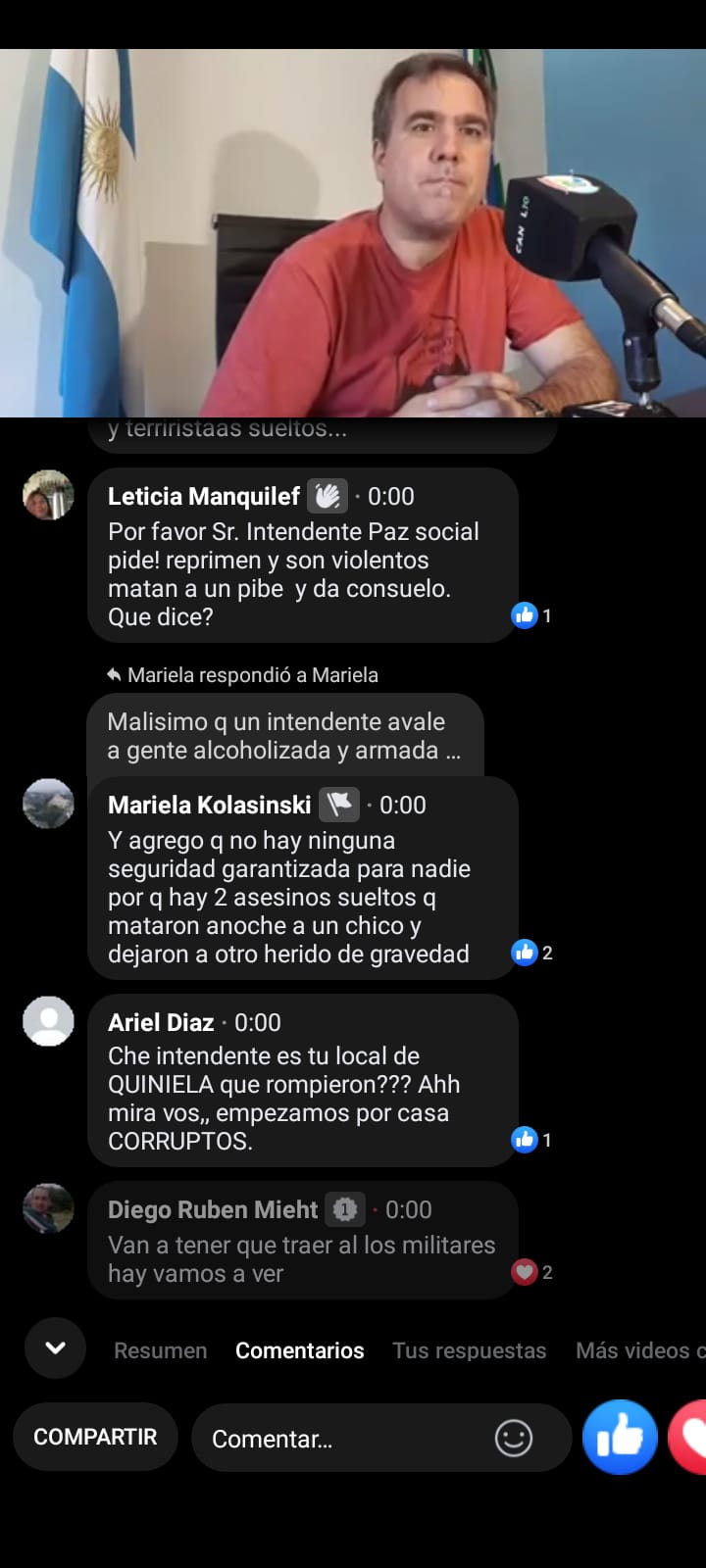
Bruno Pogliano, mayor of El Bolsón, at a press conference, endorsing the acts of the “patriotic gauchos” and demonstrating his lack of interest in the life of Elías Garay.
For her part, Soraya Maicoño, one of the only people close to the lof Quemquemtreu who was able to climb the hill, together with the prosecutor Betiana Cendón, indicated (before climbing) that “there was a free zone” which allowed two plainclothes policemen to enter the lof and attack the two people to death.
The context of the murder of Elías Garay is not anecdotal. It occurs at a time when the law 26.160 on territorial survey is being discussed – which would guarantee the right to remain in the territory of the lof Quemquentreu – and it occurs after the legislative elections were held last Sunday (14 November) throughout the country and Elías Garay’s own companion denounced members of the Special Operations and Rescue Corps (COER) for sexual abuse. None of these three facts can be ignored in the analysis of the case. “Now it’s really going to get pretty”, let slip a COER officer, referring to the end of the elections and the possible authorisation for them to act against the members of the territorial recovery. This last piece of information was added by Mauro Millán, in a press conference together with Nelson Ávalos (member of APDH Noroeste de Chubut), both present from the beginning, at the 12th police station and the El Bolsón Area Hospital.
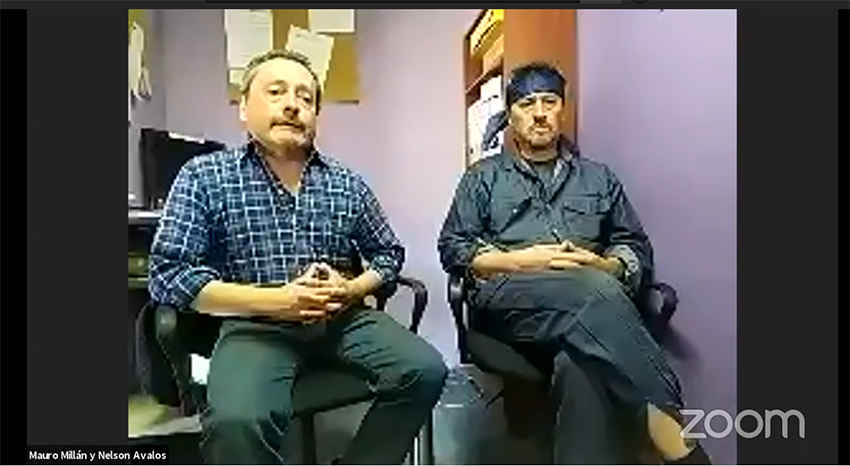
Press conference by Mauro Millán and Néstor Ávalos. Video capture
All this time they were waiting for the right moment. All this time they were waiting for an order from the governor of Río Negro (Arabela Carreras) to act.
The fourth fact that cannot be omitted in this analysis is the one mentioned and incorporated by the mayor Bruno Pogliano in allusion to tourism. The tourist months are approaching in a city that depends exclusively on this economic dynamic, with the aggravating factor that it was closed for two years as a consequence of the social isolation caused by the pandemic.
The economic interests in the territory are real. Just as the constant pressure from the provincial and national governments is real if laws favouring pre-existing communities in Argentina are passed or, worse still, if more territorial recuperations (something that is irreversible and constantly on the rise) by other Mapuche communities continue to take place.
At this time, it is expected that the body of Elías Garay will be taken down from the hill, the state of the rest of the people who remain in the lof is constant, and the last medical report of Gonzalo Cabrera, who is still in the Area Hospital of El Bolsón with a reserved prognosis, will be given.
“We need the Special Operations and Rescue Corps (COER) to leave the road so that we can hold a dignified eluwvn (Mapuche wake) for our peñi. With our kimvn (wisdom), with our cultural practices. We cannot hold a ceremony with police forces around us”, argued Mauro Millán before closing the press conference that took place at two o’clock in the afternoon today, Monday 22 November.
The national and provincial states know that at this moment dozens of people and families are beginning, like Elías Garay, a slow process of recognition with respect to the pre-existing peoples that still inhabit Argentina. And that the best defence against these identity – and therefore territorial – recoveries is to promote visual signs, cultural practices and sentiments that allow the national, colonial, homogenising and monocultural patriotic identity to be vindicated. An example of this is the recent law that was passed to make it compulsory for schools in Tierra del Fuego to use embroidery on school uniforms with the slogan “Las Malvinas son Argentinas” (The Malvinas are Argentine). However, we all know where nationalist claims lead. History has taught us. The expressions (and omissions) of the public officials and men who acted last night in El Bolsón are just one expression of this, within a society such as Argentina’s, which is pitifully determined to decolonise its thinking, actions and ways of contemplating and understanding other peoples.
“The intellectual authors of these shootings must be investigated and denounced. We cannot naturalise a murder”, concluded Mauro Millán, drawing attention to the Minister of Security of the Nation, the governor of the province of Río Negro Arabela Carrera – who for now has only maintained that she did not give the order for the police and special forces to act -, Judge Francisco Arrien (acting in the case), the prosecutor Betiana Cendón, the commissioner in charge of the operation Osvaldo Tellería, the Special Operations and Rescue Corps (COER), the rural society of Río Negro and the Rocco family.


